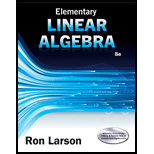
Concept explainers
Guided Proof Prove that a nonempty subset of a finite set of linearly independent vectors is linearly independent.
Getting Started: You need to show that a subset of a linearly independent set of vectors cannot be linearly dependent.
(i) Assume
(ii) If
(iii) Use this fact to derive a contradiction and conclude that
Want to see the full answer?
Check out a sample textbook solution
Chapter 4 Solutions
Elementary Linear Algebra (MindTap Course List)
- Take this test to review the material in Chapters 4 and 5. After you are finished, check your work against the answers in the back of the book. a Explain what it means to say that a set of vectors is linearly independent. b Determine whether the set S is linearly dependent or independent. S={(1,0,1,0),(0,3,0,1),(1,1,2,2),(3,4,1,2)}arrow_forwardLet v1, v2, and v3 be three linearly independent vectors in a vector space V. Is the set {v12v2,2v23v3,3v3v1} linearly dependent or linearly independent? Explain.arrow_forwardProof Let {v1,v2,...,vn} be a linearly independent set of vectors in a vector space V. Delete the vector vk from this set and prove that the set {v1,v2,...,vk1} cannot span V.arrow_forward
- Proof When the set of vectors {u1,u2,...,un} is linearly independent and the set {u1,u2,...,un,v} is linearly dependent, prove that v is the linear combination of the uis.arrow_forwardProof Let A be an nn square matrix. Prove that the row vectors of A are linearly dependent if and only if the column vectors of A are linearly dependent.arrow_forwardProof Prove that if S1 and S2 are orthogonal subspaces of Rn, then their intersection consists of only the zero vector.arrow_forward
- Guided Proof Prove that if w is orthogonal to each vector in S={v1,v2,,vn}, then w is orthogonal to every linear combination of vector in S. Getting Started: To prove that w is orthogonal to every linear combination of vectors in S, you need to show that their inner product is 0. i Write v as a linear combination of vectors, with arbitrary scalars c1,,cn in S. ii Form the inner product of w and v. iii Use the properties of inner products to rewrite the inner product w,v as a linear combination of the inner products w,vi, i=1,,n. iv Use the fact that w is orthogonal to each vector in S to lead to the conclusion that w is orthogonal to v.arrow_forwardTrue or False? In Exercises 79 and 80, determine whether each statement is true or false. If a statement is true, give a reason or cite an appropriate statement from the text. If a statement is false, provide an example that shows that the statement is not true in all cases or cite an appropriate statement from the text. a If dim(V)=n, then any set of n+1 vectors in V must be linearly dependent. b If dim(V)=n, then any set of n1 vectors in V must be linearly independent.arrow_forwardProof Complete the proof of the cancellation property of vector addition by justifying each step. Prove that if u, v, and w are vectors in a vector space V such that u+w=v+w, then u=v. u+w=v+wu+w+(w)=v+w+(w)a._u+(w+(w))=v+(w+(w))b._u+0=v+0c._ u=vd.arrow_forward
- Proof Let S={u,v} be a linearly independent set. Prove that the set {u+v,uv} is linearly independent.arrow_forwardLinear Combinations In Exercises 1-4, write each vector as a linear combination of the vectors in Sif possible. S={(1,2,2),(2,1,1)} (a) z=(4,3,3) (b) v=(2,6,6) (c) w=(1,22,22) (d) u=(1,5,5)arrow_forward
 Elementary Linear Algebra (MindTap Course List)AlgebraISBN:9781305658004Author:Ron LarsonPublisher:Cengage LearningAlgebra & Trigonometry with Analytic GeometryAlgebraISBN:9781133382119Author:SwokowskiPublisher:Cengage
Elementary Linear Algebra (MindTap Course List)AlgebraISBN:9781305658004Author:Ron LarsonPublisher:Cengage LearningAlgebra & Trigonometry with Analytic GeometryAlgebraISBN:9781133382119Author:SwokowskiPublisher:Cengage Algebra and Trigonometry (MindTap Course List)AlgebraISBN:9781305071742Author:James Stewart, Lothar Redlin, Saleem WatsonPublisher:Cengage Learning
Algebra and Trigonometry (MindTap Course List)AlgebraISBN:9781305071742Author:James Stewart, Lothar Redlin, Saleem WatsonPublisher:Cengage Learning Trigonometry (MindTap Course List)TrigonometryISBN:9781337278461Author:Ron LarsonPublisher:Cengage Learning
Trigonometry (MindTap Course List)TrigonometryISBN:9781337278461Author:Ron LarsonPublisher:Cengage Learning College AlgebraAlgebraISBN:9781305115545Author:James Stewart, Lothar Redlin, Saleem WatsonPublisher:Cengage Learning
College AlgebraAlgebraISBN:9781305115545Author:James Stewart, Lothar Redlin, Saleem WatsonPublisher:Cengage Learning




